★★★★½
“Zoë Bell, you’re our heroine. Never change.”
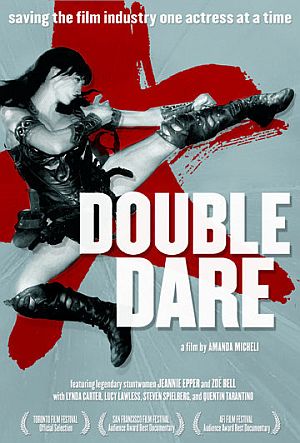
 The day after watching this documentary, I was clearing out the shed in preparation for our house move. I twisted my back, and thought about giving up, but soldiered on until the job was done – because that’s what Zoë Bell would do. It’s now my life philosophy: WWZD? She’s the main focus here, from working as Lucy Lawless’s double on Xena in New Zealand, through an unsuccessful attempt to break in to Hollywood, and on to a second try, where she’s hired to stand-in for Uma Thurman in Kill Bill. Paralleling this, it looks at Jeannie Epper, a veteran stuntwoman who shadowed Lynda Carter in Wonder Woman. Now nearing her 60th birthday, Epper is still active and seeking work, fighting against the problems of being a female in an extremely male-dominated industry.
The day after watching this documentary, I was clearing out the shed in preparation for our house move. I twisted my back, and thought about giving up, but soldiered on until the job was done – because that’s what Zoë Bell would do. It’s now my life philosophy: WWZD? She’s the main focus here, from working as Lucy Lawless’s double on Xena in New Zealand, through an unsuccessful attempt to break in to Hollywood, and on to a second try, where she’s hired to stand-in for Uma Thurman in Kill Bill. Paralleling this, it looks at Jeannie Epper, a veteran stuntwoman who shadowed Lynda Carter in Wonder Woman. Now nearing her 60th birthday, Epper is still active and seeking work, fighting against the problems of being a female in an extremely male-dominated industry.
The thing that comes over is how delightfully un-Hollywood Bell is, innocent almost to the point of naivety – she’s blissfully unaware of the need, for example, to have head shots, and drops F-bombs with a marvellously casual air. The cameras are rolling when she gets the call telling her she’s got the Kill Bill job, and her obvious, genuine delight at the news, brought a huge grin to our faces, and is completely endearing. It’s to be hoped that Hollywood doesn’t change her in the slightest, and Zoë remains the same, down-to-earth, well-grounded person shown here, who is now even more solidly entrenched among our favourite contemporary action heroines.
I have some concerns there, based on Epper; her contemplation of plastic surgery and liposuction at her age is more sad than anything else, as is watching Jeannie working the phones, basically begging for work, even though she’s a legend in the business. There’s a good heart beating in there (Epper donated a kidney to a friend, for instance), but she has clearly been ground down by her decades in the film industry, and become a lot more cynical and battle-weary as a result. That’s no wonder, when you witness her struggles trying to get equal treatment for women at the annual awards ceremony. It’s a somewhat grim reality-check, warning of the potential perils ahead for Bell in her career.
But aside from the contrast in the two heroines, this is a fascinating study in a side of the business that doesn’t get anything like the recognition it deserves. As one comment I read elsewhere said, “If you liked Uma Thurman in Kill Bill, Zoë Bell is the reason why,” and that sums up the shadows in which stuntwomen work. This film shines a light into that darkness, and both Epper and Bell deserve enormous respect and admiration for putting their bodies on the line, in the name of our entertainment. And while I’m not really a big Tarantino fan, if he turns out to be responsible for bringing Bell to a wider audience, then it’s perhaps the biggest gift his career will have given us.
Dir: Amanda Micheli
Star: Jeannie Epper, Zoë Bell





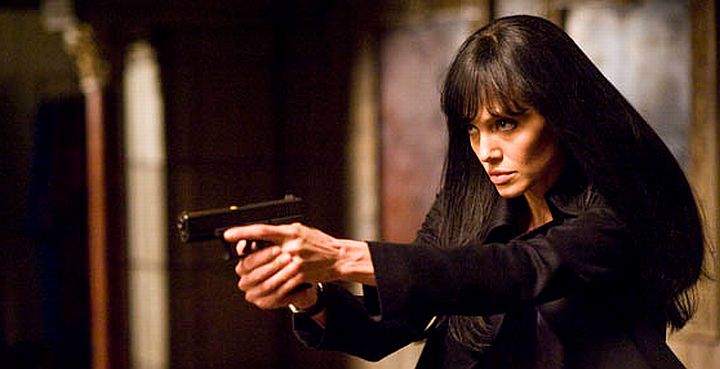 ★★★½
★★★½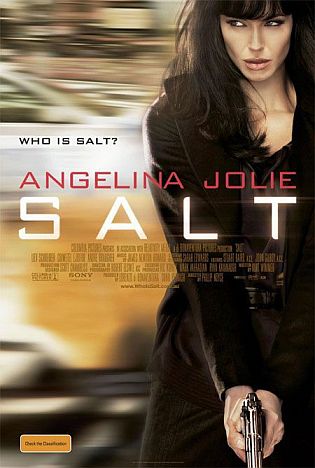 Angelina Jolie is the undisputed US box-office queen of action heroines. With
Angelina Jolie is the undisputed US box-office queen of action heroines. With  Still, it’s entertaining and keeps moving. Credit for clocking in at a brisk 100 minutes, rather than stretching things out beyong what’s necessary: there’s isn’t much unnecessary fat on its scriptual bones, and a refreshing lack of romantic chit-chat. There are a couple of solid action set-pieces, most notably an early, frenetic chase through the streets, and Salt overall has an ability to withstand falls that Wile E. Coyote would envy. Towards the end, she descends a lift-shaft leading to the presidential bunker, without bothering to wait for the elevator, and can also turn a few common cleaning supplies into an impromptu rocket-launcher. These are talents I’m sure we all could use occasionally.
Still, it’s entertaining and keeps moving. Credit for clocking in at a brisk 100 minutes, rather than stretching things out beyong what’s necessary: there’s isn’t much unnecessary fat on its scriptual bones, and a refreshing lack of romantic chit-chat. There are a couple of solid action set-pieces, most notably an early, frenetic chase through the streets, and Salt overall has an ability to withstand falls that Wile E. Coyote would envy. Towards the end, she descends a lift-shaft leading to the presidential bunker, without bothering to wait for the elevator, and can also turn a few common cleaning supplies into an impromptu rocket-launcher. These are talents I’m sure we all could use occasionally.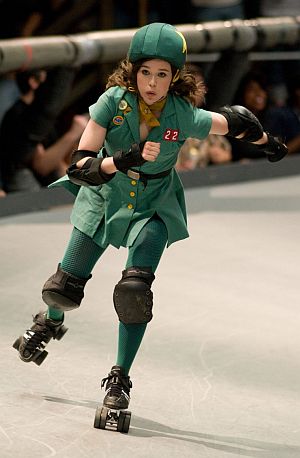 Bliss Cavendar (Page) is stuck in the hickville of Bodeen, Texas: her mother (Harden) coerces her into small-town beauty pagents, but Bliss’s heart isn’t in it. On a shopping trip to Austin, she picks up a roller-derby flyer, and on attending the event with her friend Pash (Shawkat), falls in love with the sport and decides to try out. She has to lie about her age to do so, and also keep her attendance a secret from her parents. Bliss has a natural talent, and helps her team, the Hurl Scouts, previously the doormats of the league, to the championship game against the Holy Rollers, under Iron Maven (Lewis). The confidence Bliss gains is not without its issues however, bringing her in to conflict with her boyfriend and Pash, as well as her parents…
Bliss Cavendar (Page) is stuck in the hickville of Bodeen, Texas: her mother (Harden) coerces her into small-town beauty pagents, but Bliss’s heart isn’t in it. On a shopping trip to Austin, she picks up a roller-derby flyer, and on attending the event with her friend Pash (Shawkat), falls in love with the sport and decides to try out. She has to lie about her age to do so, and also keep her attendance a secret from her parents. Bliss has a natural talent, and helps her team, the Hurl Scouts, previously the doormats of the league, to the championship game against the Holy Rollers, under Iron Maven (Lewis). The confidence Bliss gains is not without its issues however, bringing her in to conflict with her boyfriend and Pash, as well as her parents…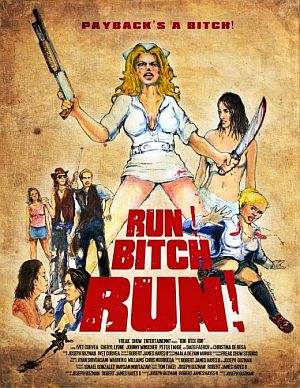 I can certainly appreciate where the makers are trying to go with this one. Two Catholic schoolgirls, selling Bible door-to-door to raise funds for their educational establishment. Unfortunately, they knock on the wrong door: this is actually a whorehouse, run by the psychotic Lobo (Tahoe), who has just killed one of his hookers. The two are kidnapped: one is killed, while the other (Lyone) is left for dead, naked, in the nearby woods. She is taken to hospital, but has only a single thought in her head: revenge. Stealing a nurse’s uniform, she checks out, intent on taking our her wrath on Lobo and his no-less depraved sidekicks.
I can certainly appreciate where the makers are trying to go with this one. Two Catholic schoolgirls, selling Bible door-to-door to raise funds for their educational establishment. Unfortunately, they knock on the wrong door: this is actually a whorehouse, run by the psychotic Lobo (Tahoe), who has just killed one of his hookers. The two are kidnapped: one is killed, while the other (Lyone) is left for dead, naked, in the nearby woods. She is taken to hospital, but has only a single thought in her head: revenge. Stealing a nurse’s uniform, she checks out, intent on taking our her wrath on Lobo and his no-less depraved sidekicks.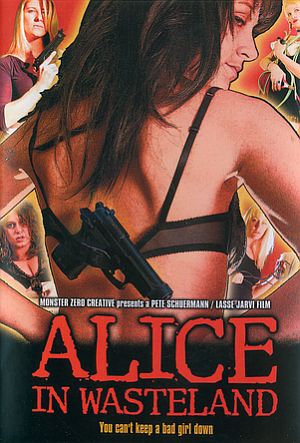 Ok, that brief is a little harsh, but it is true to say by the end, I had opted to double-task, and was watching this while I stood over the sink in the kitchen. It wasn’t as good as I expected: I was hoping for something along the lines of Faster, Pussycat, and instead got a turgid, over-extended crime drama. While it has all the right aspirations, the yawning chasm between that and its execution would require several days’ trip by mule to cross. Alice Wynn (Sondrup) is part of an armored-truck robbery, only to find herself double-crossed and left for dead by corrupt cop Jill Robbe (Beisner). Alice vows to recover the loot and take revenge on Robbe, and won’t let anyone – examples include her late mother’s boyfriend, psychotic pimp Ramrod or his Swedish assassin – stand in her way.
Ok, that brief is a little harsh, but it is true to say by the end, I had opted to double-task, and was watching this while I stood over the sink in the kitchen. It wasn’t as good as I expected: I was hoping for something along the lines of Faster, Pussycat, and instead got a turgid, over-extended crime drama. While it has all the right aspirations, the yawning chasm between that and its execution would require several days’ trip by mule to cross. Alice Wynn (Sondrup) is part of an armored-truck robbery, only to find herself double-crossed and left for dead by corrupt cop Jill Robbe (Beisner). Alice vows to recover the loot and take revenge on Robbe, and won’t let anyone – examples include her late mother’s boyfriend, psychotic pimp Ramrod or his Swedish assassin – stand in her way.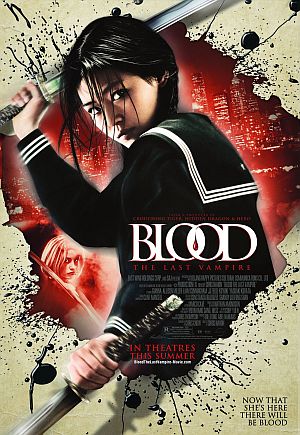 The animated version was one of the first reviews I wrote for the site, and I didn’t like it much – the fifty-minute running time allowed for hardly any development of scenario or characters at all. The feature fares a good bit better in these departments, though suffers from some horrendous editing styles and a couple of monsters which appear to have strayed in from a Playstation game (and I am not talking Playstation 3 here, either). The basic plot is retained. Saya (Gianna) is a half-demon with a grudge, intent on taking out Onigen (Koyuki), the one responsible for the death of her father. Working under the loose guidance of The Council, she is inserted into a school on an American air-force base in 1970 Japan. American girl Alice (Miller) has been added; Saya rescues her, and the two end up on the run, pursued both by Onigen and more regular forces.
The animated version was one of the first reviews I wrote for the site, and I didn’t like it much – the fifty-minute running time allowed for hardly any development of scenario or characters at all. The feature fares a good bit better in these departments, though suffers from some horrendous editing styles and a couple of monsters which appear to have strayed in from a Playstation game (and I am not talking Playstation 3 here, either). The basic plot is retained. Saya (Gianna) is a half-demon with a grudge, intent on taking out Onigen (Koyuki), the one responsible for the death of her father. Working under the loose guidance of The Council, she is inserted into a school on an American air-force base in 1970 Japan. American girl Alice (Miller) has been added; Saya rescues her, and the two end up on the run, pursued both by Onigen and more regular forces.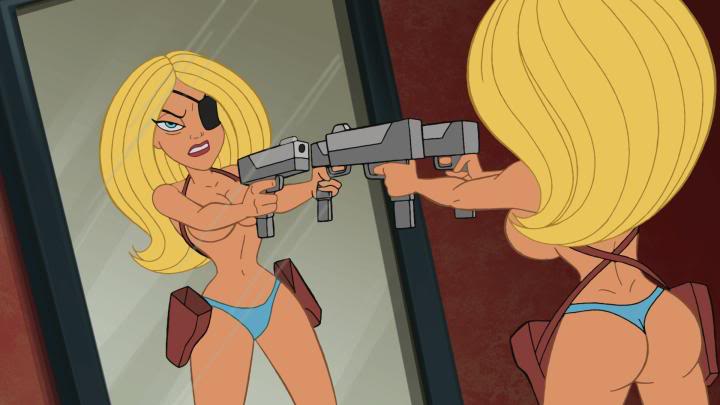 ★★★★
★★★★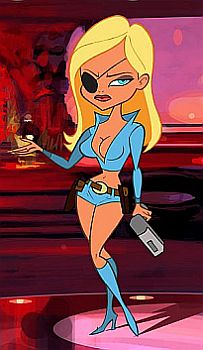
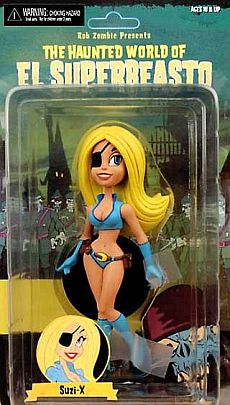 Zombie was responsible for the Werewolf Women of the SS faux-trailer in Grindhouse, and brings much the same gleeful approach to proceedings here. Indeed, we first see Suzi-X kidnapping the head of Hitler, which is kept alive in a jar (as in They Saved Hitler’s Brain), and then has to escape by fighting her way through a massive pack of Nazi zombies (that’d be from Shock Waves). Carnage ensues, as it pretty much does, any time Suzi-X is on the screen, which is a lot – she gets far more of the action than El Superbeasto does. Proceedings culminate in a lengthy, slo-mo catfight, entirely necessary to the plot, between her and Von Black, while the soundtrack cheerily informs us that “It’s OK to jerk off to cartoons – the Japanese do it every day – so rub one out for the USA…”
Zombie was responsible for the Werewolf Women of the SS faux-trailer in Grindhouse, and brings much the same gleeful approach to proceedings here. Indeed, we first see Suzi-X kidnapping the head of Hitler, which is kept alive in a jar (as in They Saved Hitler’s Brain), and then has to escape by fighting her way through a massive pack of Nazi zombies (that’d be from Shock Waves). Carnage ensues, as it pretty much does, any time Suzi-X is on the screen, which is a lot – she gets far more of the action than El Superbeasto does. Proceedings culminate in a lengthy, slo-mo catfight, entirely necessary to the plot, between her and Von Black, while the soundtrack cheerily informs us that “It’s OK to jerk off to cartoons – the Japanese do it every day – so rub one out for the USA…”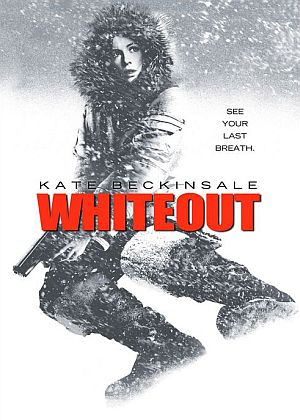 “Oh, look,” I said to Chris. “Whiteout is just starting. It’s about a US marshal investigating a murder in Antarctica. Let’s take a look, shall we?” And, of course, the first thing we see is Kate Beckinsale bending over in her underwear, as she undresses to take a shower. I haven’t heard her eyes whirring as they rolled in her skull like that, probably since the first 20 minutes of Bitch Slap. I’ll have to sit through a few Ghost Whisperer episodes to make up for that. God forbid, maybe even stay awake for one. The sad news is, that was probably the most memorable moment in a film which, on balance, is marginally less interesting than the weather phenomena name-checked in the title.
“Oh, look,” I said to Chris. “Whiteout is just starting. It’s about a US marshal investigating a murder in Antarctica. Let’s take a look, shall we?” And, of course, the first thing we see is Kate Beckinsale bending over in her underwear, as she undresses to take a shower. I haven’t heard her eyes whirring as they rolled in her skull like that, probably since the first 20 minutes of Bitch Slap. I’ll have to sit through a few Ghost Whisperer episodes to make up for that. God forbid, maybe even stay awake for one. The sad news is, that was probably the most memorable moment in a film which, on balance, is marginally less interesting than the weather phenomena name-checked in the title.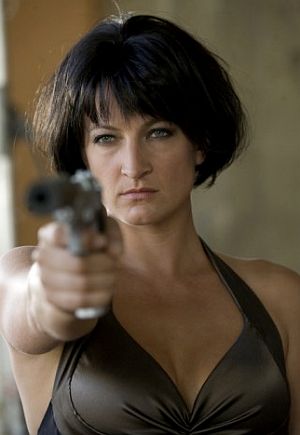 After making an undeniable impact strapped to a car bonnet in the second-half of Grindhouse, Zo…Hang on, let me find the right key on the keyboard… Ah, there we are… Zoë gets to do some actual ‘acting’, rather than playing a stuntwoman called Zoë Bell [Way to go, Tarantino!] Thios started as a web-based series of ten episodes, but is now available on DVD, which is how we watched it. Bell plays Eve, an assassin whose personality radically changes after she is stabbed in the head. She starts to see one of her victims – a young girl – and as a result, decides to go after those who ordered the death. Needless to say, her manager and handler Graham (Poth) is not impressed by this sudden burst of morality, and neither are those who have now become her target, including up-and-coming gangster boss Jake Abel, who sends his minions out to take care of her before she takes care of him.
After making an undeniable impact strapped to a car bonnet in the second-half of Grindhouse, Zo…Hang on, let me find the right key on the keyboard… Ah, there we are… Zoë gets to do some actual ‘acting’, rather than playing a stuntwoman called Zoë Bell [Way to go, Tarantino!] Thios started as a web-based series of ten episodes, but is now available on DVD, which is how we watched it. Bell plays Eve, an assassin whose personality radically changes after she is stabbed in the head. She starts to see one of her victims – a young girl – and as a result, decides to go after those who ordered the death. Needless to say, her manager and handler Graham (Poth) is not impressed by this sudden burst of morality, and neither are those who have now become her target, including up-and-coming gangster boss Jake Abel, who sends his minions out to take care of her before she takes care of him.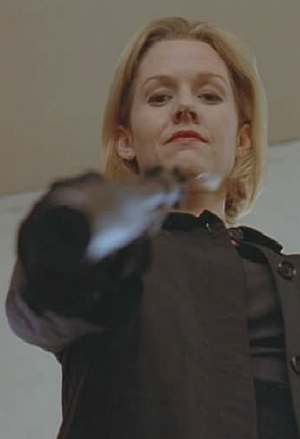 Ward (whom we’ll watch in anything, as payment for the enjoyment Tremors has given us) plays John McWhirter, a hard-bitten journalist with a fondness for the bottle, who is still trying to put behind him an incident when he was a young radical, that led to his friends being sent to jail for long terms, while John escaped doing time. He’s looking into the murder of an industrialist by Palestinian terrorists, when said friends show up, asking him to hide a woman (Ticotin) from the authorities for a few days, describing her as an activist in Shining Path, a Peruvian rebel group. Turns out she’s not who she seems, and it also turns out John had more to do with his friends’ arrests, thirty years ago, than it initially appeared. With enemies in the FBI, led by Robert Lecker (Plummer), an ally in the CIA, and a female assassin (Miller, right) out to tidy up all the loose ends, McWhirter has to decide whether to do what’s right, what’s easy, or what’s best for himself – and those might be three mutually exclusive options.
Ward (whom we’ll watch in anything, as payment for the enjoyment Tremors has given us) plays John McWhirter, a hard-bitten journalist with a fondness for the bottle, who is still trying to put behind him an incident when he was a young radical, that led to his friends being sent to jail for long terms, while John escaped doing time. He’s looking into the murder of an industrialist by Palestinian terrorists, when said friends show up, asking him to hide a woman (Ticotin) from the authorities for a few days, describing her as an activist in Shining Path, a Peruvian rebel group. Turns out she’s not who she seems, and it also turns out John had more to do with his friends’ arrests, thirty years ago, than it initially appeared. With enemies in the FBI, led by Robert Lecker (Plummer), an ally in the CIA, and a female assassin (Miller, right) out to tidy up all the loose ends, McWhirter has to decide whether to do what’s right, what’s easy, or what’s best for himself – and those might be three mutually exclusive options.